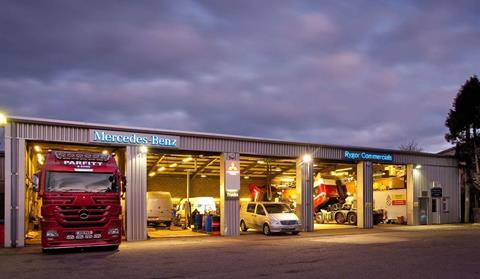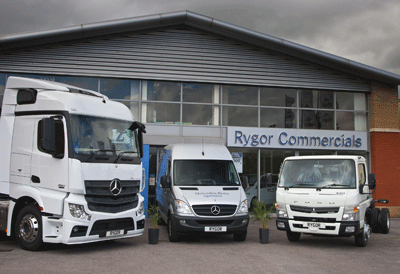
Like hauliers, truck dealers are consolidating, getting bigger, and widening the range of services they offer. Dealers no longer just sell trucks; they are increasingly taking on the vehicle repair and maintenance as more operators close their fleet engineering departments and rely on dealers for their R&M and other technical support.
Rygor Commercials is a good example of this trend. The UK’s largest Mercedes-Benz franchise following its takeover of Mudie-Bond last year, Rygor’s territory now covers much of central southern England from Kidderminster to west London and the South West as far as Wiltshire and Worcestershire.
It was in fact Mercedes-Benz who suggested Rygor approach Mudie-Bond, and five months into the merger Rygor MD Tim Stacey pronounces himself “delighted” with the acquisition, which included all 133 Mudie-Bond employees.
“They are good people, and the key to an excellent service is people,” he says. “They had a good product range from Citan to Actros, and now we also sell the Unimog. As we get bigger we can justify more specialisation.”
Based in Westbury, Wiltshire, the company is now split into two divisions: Rygor North, based on the former Mudie-Bond sites in Tewkesbury, Kidderminster, Oxford and Brackley; and Rygor South, the company’s existing dealerships in Westbury, Chilcompton, Heathrow, Reading, Newbury, Salisbury and Swindon.
Family firm
Formed in the 1960s as a family firm, Rygor became a service agent for Mercedes-Benz in 1986, becoming the main dealer for Wiltshire in 1991. In 1998 the company began expanding, taking over the territory between Newbury, Reading, Swindon and Salisbury, and adding Heathrow that covers the important west London patch in 2004.
In 2008, Rygor was taken over in a management buyout by MD Tim Stacey, dealer principal and director Paul Reed and financial director Graham Drake. Stacey says the secret to Rygor’s success is “doing the simple things right” and focusing exclusively on the CV market.
Reed, who joined in 2004, has seen both sides of the industry as he used to work for an operator running 2,000 CVs as well as having 14 years with Daf and Volvo prior to joining Rygor. He is responsible for driving Rygor’s after sales business; one of the company’s major contracts is to manage a number of the vehicle maintenance units (VMUs) looking after 1,000 vehicles run by leading foodservice firm Brakes.
“We see the all vehicle defects – including damage – and can identify any trend very quickly to assist the operator in their control of maintenance costs,” says Reed . “Operators expect repair and maintenance from a dealer – but we are increasingly taking over the fleet management role too.”
Reed’s background working for an operator has bred a strong dislike of unplanned downtime – breakdowns to most people. In fact Reed says Rygor’s philosophy is “zero tolerance”.
“Planned maintenance is OK but our customers’ biggest issue is when they can’t use their vehicle,” he says. “We have no lead time when it comes to unplanned downtime - we accept all jobs immediately and start work on the vehicle within two hours.”
That pledge extends to any operator with any vehicle, including vans and trailers as well as heavy trucks, not just existing customers who bought Mercedes-Benz from Rygor. The Brakes contract means Rygor is also adding R&M of tail-lifts to its portfolio.
Keeping this promise – with an average response time of just 53 minutes - for the past five years has only been possible because of the scale of the network. “Sometimes everybody here for example will be busy so we share resources with other branches,” says Reed. “We have grown our number of labour hours because our great service means people want to do business with us. We know that if we turn a customer away once we may have lost them forever.”
Escalation process
Rygor has also introduced an innovative vehicle off road (VOR) escalation process, which means if a customer’s vehicle is in any of its workshops for more than 24 hours, an email is sent to every parts and service manager along with all the technical specialists in the group and we pull together to get it back on the road as quickly as possible.
Rygor also has an excellent relationship with the technical department at Mercedes-Benz UK HQ in Milton Keynes and the factory in Stuttgart. “We share information with Mercedes-Benz so no-one is ever stuck with a problem alone,” says Reed.
One of the UK’s largest parcel carriers is a major Rygor customer and runs a big Sprinter fleet. “They use the product hard and they will often find problems first,” says Reed. “If we see recurring problems we report them to Stuttgart, and if we find problems that are outside warranty we will back the operator’s case.”
Five of Rygor’s sites now carry out annual testing for vans; the South division headquarters Westbury is a Designated Premises (DP) offering the full range of testing services and the company is looking at upgrading one of its branches in the North to DP or Authorised Testing Facility status.
Rygor’s attitude to reducing downtime extends to annual testing, according to Reed. “Some dealers take the vehicle off the road for two or three days for the annual test but we prepare it overnight and test the next day,” he says. “We have the second highest first-time annual test pass rate in the UK at 96%, which is bettered only by a small single-location dealership.”
The target for 2013 is over 97%, compared with the national average of around 77%.

The opening hours of each branch are tailored to the local requirements of its customer base. The Heathrow site serving west London for example has extended its hours so the service department is now open until 10pm on a Monday and then 24 hrs from Tuesday 6am until Saturday 1pm.
Despite the government’s recent U-turn on fuel duty, diesel remains every operator’s biggest operating cost, and the fuel savings promised by the new Actros are proving a big draw for operators.
One “staunch user” of a rival marque has taken three Actros units on contract hire and has been pleased with their fuel economy. “That gives us an ‘in’ with customers using other makes. They cannot ignore the fuel savings – even 0.5mpg makes a big difference,” says Stacey. "They then see the high levels of service we offer.”
With the support of Mercedes-Benz Finance, Rygor has increased the number of vehicles its customers have taken on contract hire with an R&M package, which gives the operator the peace of mind of a single fixed monthly payment for the vehicle.
Reed says that, while finance and R & M is provided by Mercedes-Benz, Rygor writes its own R&M contracts when and if additional flexibility if required – and they can extend to other makes of vehicle.
“Availability of funding through Mercedes-Benz Finance is now much greater and at better rates,” says Stacey. “That makes it easier for operators and removes an obstacle to them getting a new Mercedes-Benz.”
Flexibility
He adds that operators are now far keener on two to three year contract hire than traditional hire purchase, because of the added flexibility it provides. “It especially makes sense for tractor units,” observes Stacey. “We are seeing operators wanting longer contract hire periods. They may take a new Mercedes-Benz on a two to three year contract, try it, love it and then take the next batch on five or six year contracts.”
The Euro-5 version of the new Actros is proving to be one of the most fuel efficient tractors currently available, and Stacey says that the handful of customers who are running the Euro-6 version are also finding it “good on fuel”. Stacey believes that while the purchase price of Euro-6 is higher than Euro-5, he says the residual values will be correspondingly better.
“That is taking away a lot of the pain,” he argues. “We can plan a second use for the vehicle at the start of the contract or offer the operator the option to buy at the end.”
Rygor does not currently offer customers spot rental, but this is something Stacey is considering. “It would be good to add rental to the business,” he says. “We have 17 sites now and that justifies a rental fleet.”
As more fleets are closing their fleet engineering departments, so they are turning to Rygor for help in specifying the right vehicle for the job. “We increasingly specify the vehicle and deal with the bodybuilder to project manage the design and build of the truck,” says Stacey. “The old-school fleet engineer is disappearing and many of those who are left are more admin than technical.”
According to Reed, many operators are realising that running an inhouse workshop costs more and increases vehicle downtime compared to outsourcing R&M to a main dealer. This equation will only further towards third party R&M with the advent of more complicated Euro-6 trucks.
“Some operators still run their own workshops but they are realising they can cost more,” says Reed. “But it is the issues of quality of work and training technicians that are the main reasons they come to dealers. We are very aggressive in the operation of VMUs and can do it very cost effectively. Even large operators would have to employ more technicians than we do to cover the downtime. The success of any workshop depends on productivity – if you don’t manage that you can lose a lot of money.”
Reduced downtime
With 170 technicians employed across the network, Rygor has the scale and flexibility to carry out R&M more cost effectively than all but the largest fleet operator. Reed can point to success stories where improved maintenance has led to reduced downtime and so enabled a reduction in fleet size. “Our customer Brakes was able to take a number of vehicles off the road because we cut their downtime,” he says.
Reed also warns that some operators who do their own maintenance are “wide open to Vosa” because of a lack of management and training in the workshop. Equally he supports calls from operators concerned about the lack of statutory control over third party VMUs and dealer workshops for some sort of licensing scheme to regulate the sector.
“I would agree with some sort of O-licence for dealers and non-franchised VMUs - but it will take time.” he says. “At the moment there are no consequences of failure for the maintenance supplier. Technicians should be accountable for their failures. I am not a fan of FTA assessments – we need to get more serious about this.”
Technology is already helping to improve vehicle uptime, with some fleets starting to base preventative maintenance inspections (PMIs) on vehicle condition data transmitted via the onboard telematics rather than fixed six or eight weekly intervals.
Traffic commissioners are increasingly open to extended PMI intervals provided the operator can demonstrate they are monitoring the condition of the vehicle effectively; many other European countries rely on an annual inspection before the test to check vehicle condition.
“Some big fleets have gone to nine- or 12-week PMI intervals,” says Reed. “High mileage trunking will often see fewer defects than a lower mileage multi-drop operation so the extension of O-licence interval for lower mileage vehicles is questionable.”
Technology
One problem with third party R&M is how to capture and act on daily defect reports generated by drivers’ morning walkaround checks. Technology is also coming the rescue here, with Mercedes-Benz’s innovative key fob that allows drivers to log and transmit the results of their daily walkaround to the VMU.
While Stacey has no desire to add other CV makes to Rygor’s portfolio, pronouncing himself happy with the Mercedes-Benz product line up, he says “there is no limit to Rygor’s ambitions”.
“New products gives us a reason to talk to new customers,” he says. “Citan is the first of that new type of product.”














